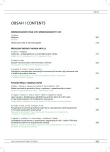Adult Form of Glutaric Aciduri a Type II – Under di agnosed Ca useof Proximal Myopathy – a Case Report
Authors:
H. Jahnová 1,2; P. Chrastina 1; M. Havlová 3; J. Zámečník 4
Authors place of work:
Ústav dědičných metabolických poruch VFN a 1. LF UK v Praze, 2Klinika dětí a dorostu FNKV, Praha, 3Neurologická klinika VFN a 1. LF UK v Praze, 4Ústav patologi e a molekulární medicíny FN Motol a 2. LF UK v Praze
1
Published in the journal:
Cesk Slov Neurol N 2009; 72/105(3): 260-264
Category:
Kazuistika
Summary
Glutaric aciduri a type II or multiple acyl‑ CoA dehydrogenase defici ency (MIM 231680) is an a utosomal recessively inherited disorder with heterogene o us clinical manifestati on and genetic backgro und, bi ochemically characterized by the accumulati on of specific metabolites so urcing from the defici ent capacity of flavin oxidative enzymes transferring electrons into the system of electron- transfer flavoprotein (ETF) and electron- transfer flavoprotein:ubiquinone oxidoreductase (ETF:QO). Clinical phenotypes include not only the lethal ne onatal forms, but also the late‑onset disorder, which usu ally manifests with proximal myopathic syndrome and sometimes with attacks of hypoketotic hypoglycemi a. The incidence of the myopathic form of glutaric aciduria type II has not been determined; nevertheless, owing to e asi er access to novel di agnostic methods, including tandem mass spectrometry, and the ever incre asing awareness of clinici ans, the number of di agnosed pati ents has been growing constantly. The case report of o ur pati ent, for the first time di agnosed on the DNA level in the Czech Republic, illustrates not only the clinical co urse of the dise ase, but also the possibiliti es of di agnostics and therapy. It might serve as an inspirati on for ne urological practice.
Key words:
glutaric aciduria type II – multiple acyl coenzyme A dehydrogenase deficiency – proximal myopathy – riboflavin
Zdroje
1. Frerman FE, Go odman SI. Defects of electron transfer flavoprotein and electron transfer flavoprotein‑ubiquinone oxidoreductase: glutaric acidemi a type II. In: Scriver CR, Be a udet AL, Sly WL, Valle D (eds). The metabolic and molecular bases of inherited dise ase. New York: McGraw- Hill 2001: 2357– 2365.
2. Duran M. Disorders of Mitochondri al Fatty Acid Oxidati on and Ketone Body Handling. In: Bla u N, Duran M, Blaskovics ME, Gibson KM (eds). Physici an’s guide to the laboratory di agnosis of metabolic dise ases. 2nd ed. Heidelberg: Springer- Verlag 2003: 309– 334.
3. Depeint W, Bruce R, Shangari N, Mehta R, O’Bri en PJ. Mitochondri al functi on and the B- vitamin family on mitochondri al energy metabolism. Chem Bi ol Interact 2006; 163(1– 2): 94– 112.
4. Olsen RK, Andresen B, Christensen E, Bross P, Skovby F, Gregersen N. Cle ar relati onship between ETF/ ETFDH genotype and phenotype in pati ents with multiple acyl- CoA dehydrogenati on defici ency. Hum Mutat 2003; 22(1): 12– 23.
5. Olsen RK, Olpin SE, Andresen BS, Mi edzybrodzka ZH, Po urfarzam M, Merinero B et al. ETFDH mutati ons as a major ca use of riboflavin‑responsive multiple acyl‑ CoA dehydrogenati on defici ency. Brain 2007; 130(8): 2045– 2054.
6. Gempel K, Topaloglu H, Talim B, Schneiderat P, Schosser BGH, Hans VH et al. The myopathic form of coenzyme Q10 defici ency is ca used by mutati ons in the electron- transferring- flavoprotein dehydrogenase (ETFDH) gene. Brain 2007; 130(8): 2037– 2044.
7. Köppel S, Gottschalk J, Hoffmann GF, Waterham HR, Blobel H, Kölker S. Late‑onset multiple acyl‑ CoA dehydrogenase defici ency: a frequently missed di agnosis? Ne urology 2006; 67(8): 1519.
8. Bednařík J et al (eds). Nemoci kosterního svalstva. Praha: Triton: 2001: 136– 142.
9. Angelini C, Nardetto L, Fanin M, Nascini AC, Tasca E.Heterogeno us pathogenesis of LGMD2: consequences for therapy. Basic Appli ed Myology 2007; 17(3– 4): 173– 179.
Štítky
Dětská neurologie Neurochirurgie NeurologieČlánek vyšel v časopise
Česká a slovenská neurologie a neurochirurgie

2009 Číslo 3
Nejčtenější v tomto čísle
- Autologní transplantace kmenových krvetvorných buněk a její so učasná role v léčbě roztro ušené sklerózy
- Migréna
- Adultní forma glutarové aciduri e II. typu – nedostatečně di agnostikovaná příčina proximální myopati e – kazuistika
- Transpozice šlachy m. tibi alis posteri or – efektivní řešení parézy perone álních svalů
